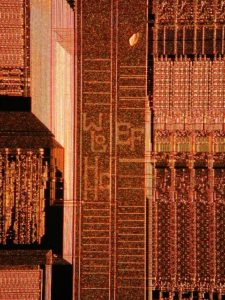 Break IC PIC16C74B Binary
Break IC PIC16C74B Binary
Break IC PIC16C74B by disabling its security fuse bit, this process will refer to MCU cracking and focus ion beam, Binary inside the program memory of Microcontroller can be extracted and rewrite to new Microprocessor PIC16C74B;

Break IC PIC16C74B by disabling its security fuse bit, this process will refer to MCU cracking and focus ion beam, Binary inside the program memory of Microcontroller can be extracted and rewrite to new Microprocessor PIC16C74B
A variety of frequency ranges and packaging options are available. Depending on application and production requirements, the proper device option can be selected using the information in the PIC16C74B Product Identification System section at the end of this data sheet. When placing orders if copy dsp TMS320LF2401AVFA flash memory, please use that page of the data sheet to specify the correct part number.
For the PIC16C7X family, there are two device “types” as indicated in the device number:
1. C, as in PIC16C74. These devices have EPROM type memory and operate over the standard voltage range.
2. LC, as in PIC16LC74. These devices have EPROM type memory and operate over an extended voltage range after Break IC.
The UV erasable version, offered in windowed CERDIP packages, is optimal for prototype development and pilot programs. This version can be erased and reprogrammed to any of the oscillator modes. Microchip’s PICSTART Plus and PRO MATE II programmers both support programming of the PIC16C63A/65B/73B/74B when Break IC.
The availability of OTP devices is especially useful for customers who need the flexibility for frequent code updates and small volume applications.
The OTP devices, packaged in plastic packages, permit the user to program them once. In addition to the program memory, the configuration bits must also be programmed before chip PIC16F73 program copying.
Microchip offers a QTP Programming Service for factory production orders. This service is made available for users who choose not to program a medium to high quantity of units and whose code patterns have stabilized. The devices are identical to the OTP devices but with all EPROM locations and configuration options already programmed by the factory. Certain code and prototype verification procedures apply before production shipments are available. Please contact your local Microchip Technology sales office for more details.
Microchip offers a unique programming service where a few user-defined locations in each device are programmed with different serial numbers. The serial numbers may be random, pseudo-random or sequential.
Serial programming allows each device to have a unique number, which can serve as an entry code, password or ID number.
The high performance of the PIC16CXX family can be attributed to a number of architectural features commonly found in RISC microprocessors. To begin with, the PIC16CXX uses a Harvard architecture, in which program and data are accessed from separate memories using separate buses.
This improves bandwidth over traditional von Neumann architecture, in which program and data are fetched from the same memory using the same bus. Separating program and data buses further allows instructions to be sized differently than the 8-bit wide data word. Instruction opcodes are 14-bits wide, making it possible to have all single word instructions.
A 14-bit wide program memory access bus fetches a 14-bit instruction in a single cycle. A two-stage pipeline overlaps fetch and execution of instructions (Example 3-1). Consequently, most instructions execute in a single cycle (200 ns @ 20 MHz) except for program branches. All devices covered by this data sheet contain 4K x 14-bit program memory and 192 x 8-bit data memory.